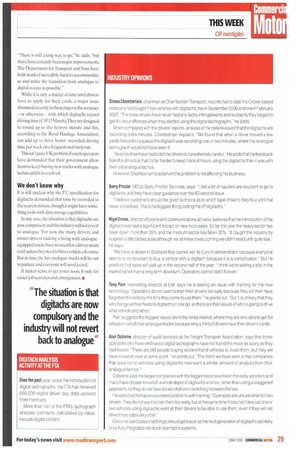INDUSTRY OPINIONS Simon Chamberlain chairman at Chamberlain Transport, reports that
Page 29

If you've noticed an error in this article please click here to report it so we can fix it.
to date the Crewe-based company I las bought three vehicles with digitachs; two in September 2006 and one in February 2007. "The three drivers have never had any tacho infringements and suddenly they began to get 4%;,-hour offences when they started using the digital tachographs," he adds.
When compared with the drivers' reports, analysis of the data revealed that the digitachs are recording extra minutes. Chamberlain explains: "We found that when a driver moved a few yards forward in a queue the dig itach was recording one or two minutes, where the analogue tachograph would not have seen it.
"As a result we have had to tell the drivers to be extremely careful." He adds that the feed back from the drivers is that it's far harder to keep track of hours using the digitachs than it was with their old analogue tachos.
However, Chamberlain is adamant the problem is not affecting his business.
Barry Proctor, MD at Barry Proctor Services, says, feel a lot of hauliers are reluctant to go to digitachs until they have clear guidance over the 60-second issue.
"I believe customers should be given a choice as to which type of tacho they buy until that issue is resolved. That's the biggest thing putting me off digitachs."
Nigel Emms, director of brand and communications at lveco, believes that the introduction of the dig Itach has had a significant impact on new truck sales. So far this year the heavy sector has been down more than 35% and the medium sector has fallen 30%. "It caught the industry by surprise a little bit because although we all knew it was coming we didn't react until quite late," he says.
"We have a dealer in Scotland that cannot sell its Euro-4 demonstrator because everyone seems to be reluctant to buy a vehicle with a digitach because it is a complication." But he predicts that sales will pick up in the second half of the year: 'I think we're seeing a blip in the market rather than a long-term downturn. Operators cannot stall it forever.'
Tony Pain, marketing director at Daf, says he is seeing an issue with training for the new technology. "Operators do not want to train their drivers too early because they will then have forgotten the skills by the time they come to use them," he points out. "But it is unlikely that they will change all their fleets to digitachs in one go, so there are then issues of who is going to drive what vehicle and when "
Pain suggests the biggest issues are in the rental market, where they are only able to get full utilisation out of their analogue trucks because only a third of drivers have their driver's cards.
Alan Osborne, director of audit services at the Freight Transport Association, says that those operators who have embraced digital tachographs have not found the move as scary as they had feared. "There are still people buying second-hand vehicles to avoid them, but they will have to switch over at some point," he points out. "The trend we have seen is that companies that have some vehicles using digitachs now want a similar amount of analysis from their analogue tachos."
Osborne says the larger companies with the bigger fleets have been the early adopters and many have chosen to switch a whole depot to digitachs at once, rather than using a staggered approach, so they do not face issues of drivers switching between the two.
He adds that he has encountered problems with training: "Operators are unsure when to train drivers. They do not want to train them too early, but at the same time those that have just one or two vehicles using digitachs want all their drivers to be able to use them, even if they will not drive those cabs very often."
Osborne concludes that things should get easier as the next generation of digitachs are likely to be fully integrated into truck telematics systems.


























































































































































































